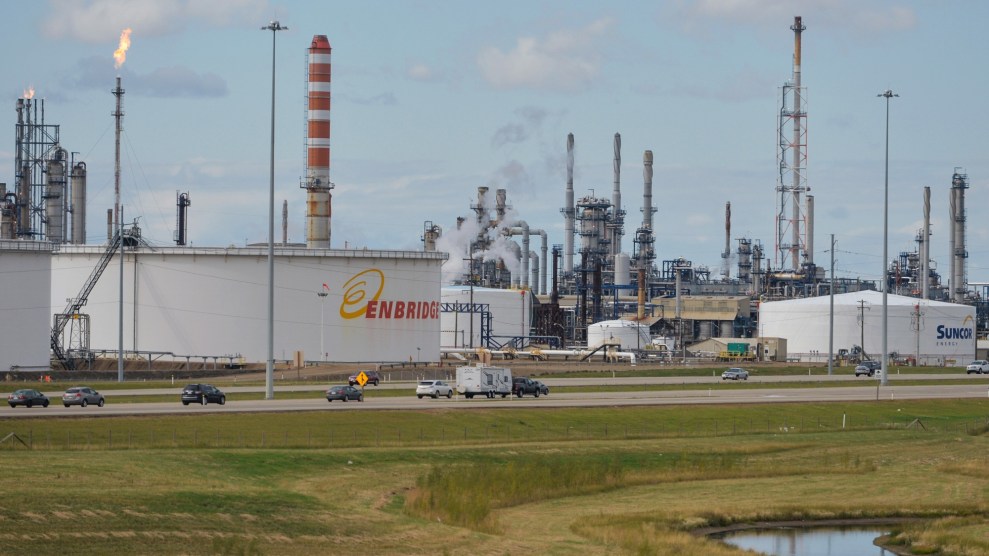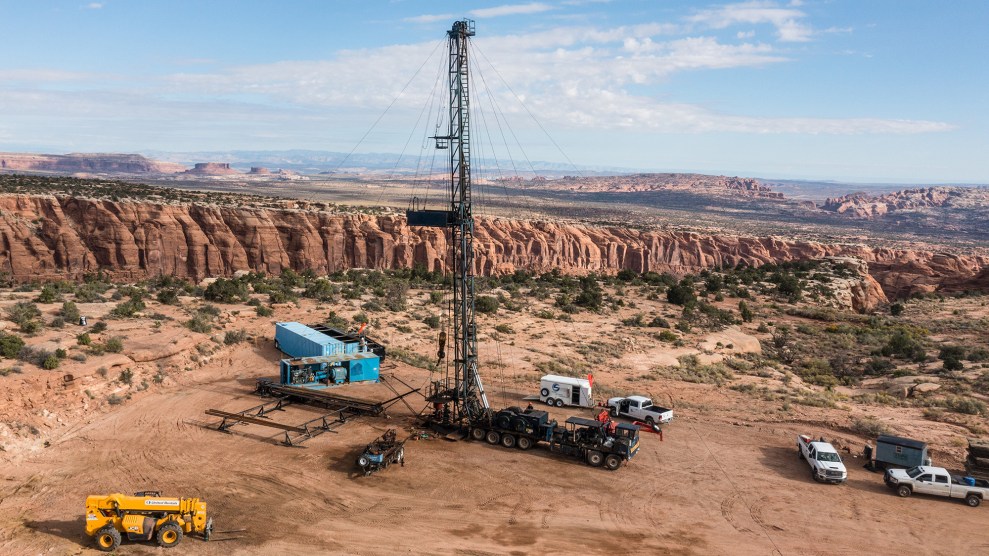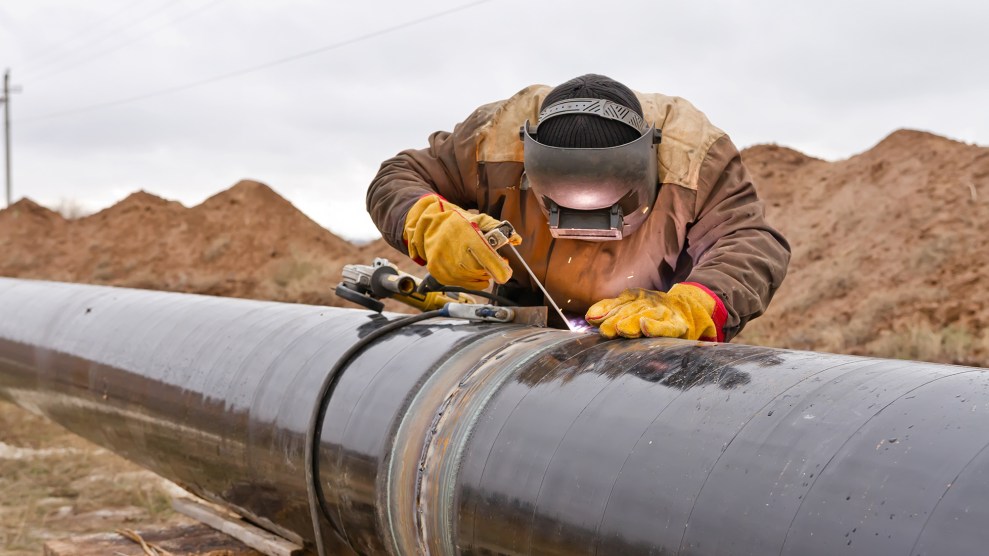
The Enbridge Terminal and Pipelines next to the Suncor Energy Refinery in Sherwood Park. Artur Widak/AP
This story was originally published by Canada’s National Observer and is reproduced here as part of the Climate Desk collaboration.
Gas companies in two of Canada’s largest provinces are relying on reports with erroneous numbers and deleted information that make natural gas appear more sustainable and cost-effective than it actually is as they race to lock in fossil fuel infrastructure for decades.
Canada’s National Observer reported a supposedly independent, third-party report that Enbridge—Ontario’s gas utility—commissioned to argue for natural gas contains data that erroneously inflated the cost of switching from natural gas to electricity for home heating. The company has cited the inaccurate information to try to convince the utility commission and the public to let it expand natural gas pipe capacity in the province.
The findings came on the heels of the revelation last week by Glacier Media that FortisBC, BC’s gas utility, demanded a report be altered to remove information that noted heat pumps and electricity are more efficient ways to decarbonize. The company also instructed the report’s authors to remove a section stating Vancouver’s municipal ban on natural gas in new buildings should be introduced province-wide.
The documents are the latest salvo in an ongoing fight by Canada’s natural gas industry to dominate the country’s energy market and push aside more efficient and sustainable eclectic methods for heating buildings and cooking. Researchers are clear that to tackle the climate crisis, we must drastically curb the use of fossil fuels—including natural gas.
“This is a crucial public debate about how municipalities are going to regulate natural gas and electricity, and it’s pretty clear that if you’re serious about climate, electricity is far preferable,” said Calvin Sandborn, senior counsel at the University of Victoria’s Environmental Law Clinic.
“What’s at stake here is the current investment in infrastructure that (could) tie us to fossil fuel use for decades right in the middle of a climate emergency.”
This issue is on full display in the FortisBC report. Commissioned from two environmental consultancy groups by FortisBC with the BC government and the BC Bioenergy Network, the document was first publicly circulated on March 3, 2023. That version contained key passages that praised the efficacy of heat pumps over gas in decarbonizing the province.
Roughly a fortnight later, the original report was replaced online with a new version where those passages had been cut by the authors at FortisBC’s request, a document obtained by Glacier Media through a freedom-of-information request shows.
The deleted passages included lines stating heat pumps are “six to eight times more efficient than heating with gas” and that in southern BC’s “moderate climate…electric heat pumps can achieve (greenhouse gas) GHG emissions reductions more effectively than renewable and low-carbon gases.”
In a statement to Glacier Media, FortisBC spokesperson Diana Sorace said the edited lines fell “out of scope” for the report.
The deletions are noteworthy because the company has relied heavily on the report to push municipalities to support the expansion of natural gas infrastructure, City of Richmond sustainability director Peter Russell said in an interview with Canada’s National Observer. The changes also come amid a pitched battle between FortisBC and several BC municipalities that are trying to ban conventional natural gas in new buildings for climate reasons.
The fight is centred on a request by FortisBC to the BC Utilities Commission to supply all new buildings with a mix of conventional gas and so-called “renewable” natural gas made from hydrogen, or food or forestry waste. Most renewable natural gas would not be produced in BC, with FortisBC instead purchasing the so-called “environmental attributes” of renewable natural gas made elsewhere.
If the changes are approved, existing customers will pay more for their gas to help foot the bill for FortisBC’s use of renewable natural gas, which is more expensive than conventional gas.
Critics say FortisBC’s request aims to circumvent a growing tide of municipal efforts to ban natural gas for climate reasons. Because provincial laws only allow BC municipalities to ban conventional natural gas—but not renewable natural gas—this approach lets FortisBC circumvent municipal natural gas bans.
It is not the first issue to have been found with the January, 2022 report. In April, Canada’s National Observer reported that FortisBC was using it to suggest that biomethane harvested from landfills and manure pits—a renewable source of gas—would account for its future natural gas supply. In reality, the study itself notes that this source will only ever supply a fraction of B.C.’s demand; the remainder will come from logging residue and hydrogen generated from natural gas.
Taken together, the revelations highlight the lengths to which Canada’s fossil fuel industry will go to modify information in the quest to protect its bottom line.
“I would say it’s shocking and unsurprising all at once,” said Stand.Earth senior campaign director Liz McDowell.
It is not the first time in recent months Canada’s natural gas industry has been caught trying to hinder climate efforts. Last November, the Competition Bureau launched a groundbreaking inquiry into the Canadian Gas Association, an industry lobby group, over one of its advertising campaigns that painted natural gas as “clean” and “affordable.” If the inquiry confirms the organization’s statements are misleading and false, it will need to stop using those terms to advertise its product, issue a retraction and potentially pay a $10-million fine.
Still, the most recent examples of FortisBC and Enbridge relying on questionable reports to bolster their business are particularly difficult to tackle, McDowell said. Because utilities primarily fall under provincial jurisdiction, it would be “really hard to figure out what it looks like to regulate this on a national level.”
Moreover, rules already exist that ban companies from using misleading information in legal proceedings. What is missing are independent experts combing through thousands of pages of industry submissions to regulatory panels, industry ads and public presentations looking for faulty assumptions and misleading information.
For municipalities like those in BC on the front lines of the fight against expanding natural gas infrastructure, hiring experts to “refute and basically attack” gas companies’ claims is pricey, said Russell, the sustainability director for Richmond, BC In his city’s case, the municipal government grouped together with several others and hired a US-based expert “at a very high-level cost” to push back against FortisBC’s claims about the efficiency of natural gas.
“I sit down sometimes and think of what would have happened had we not intervened,” he said. “This may have gone through without any real obstacles, greatly impacting households all over BC.”
A more sustainable solution is updating provincial utility regulators for the climate crisis, McDowell said. Neither the BC nor Ontario utility commissions have a mandate to support climate efforts. They also rely heavily on data provided by natural gas companies themselves, opening the door for companies to provide decision-makers with data biased in their favor. Updating regulators so they are required to protect the climate and can commission independent data could help resolve these issues, she said.
Will that happen?
“It’s a political decision,” she said.













